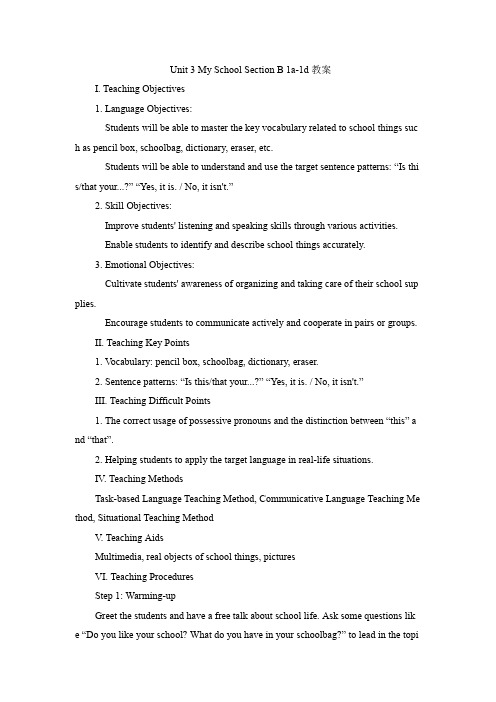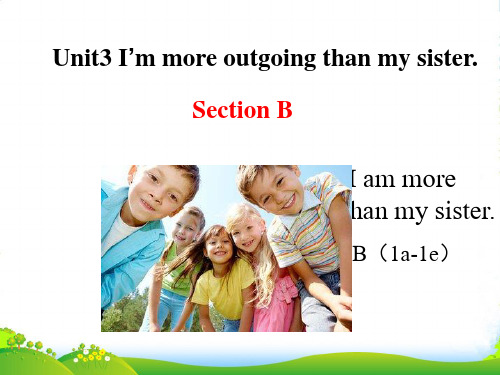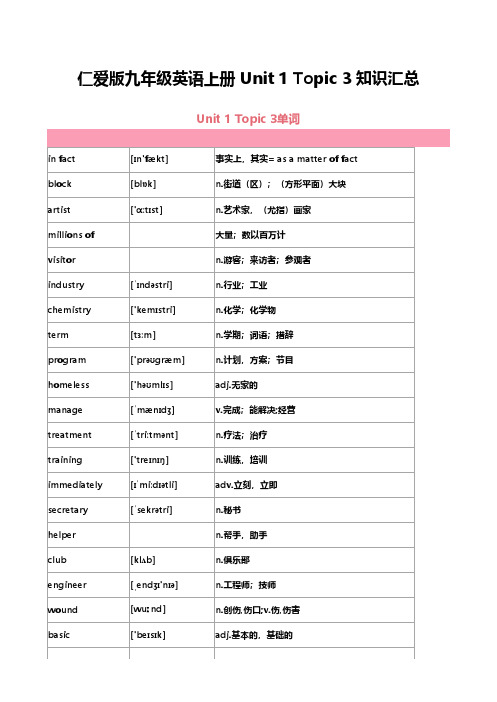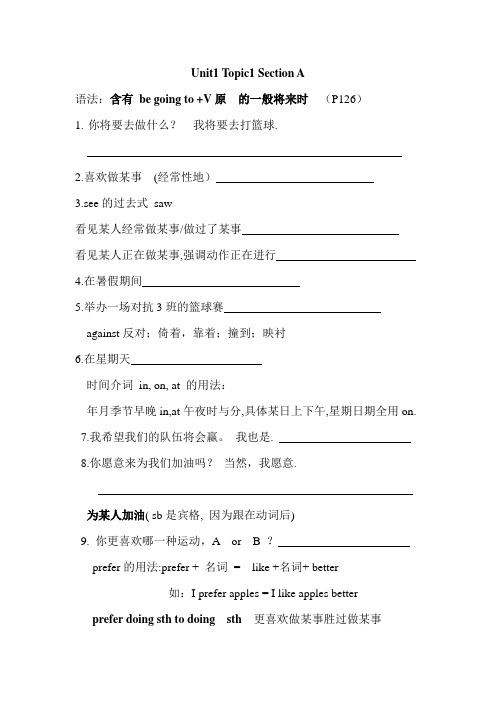Unit 1 Topic 3 Section B
英语人教版(2024)7年级上册 Unit 3 Section B 1a -1教案 教学设计

Unit 3 My School Section B 1a-1d教案I.Teaching Objectivesnguage Objectives:Students will be able to master the key vocabulary related to school things suc h as pencil box,schoolbag,dictionary,eraser,etc.Students will be able to understand and use the target sentence patterns:“Is thi s/that your...?”“Yes,it is./No,it isn't.”2.Skill Objectives:Improve students'listening and speaking skills through various activities.Enable students to identify and describe school things accurately.3.Emotional Objectives:Cultivate students'awareness of organizing and taking care of their school sup plies.Encourage students to communicate actively and cooperate in pairs or groups.II.Teaching Key Points1.V ocabulary:pencil box,schoolbag,dictionary,eraser.2.Sentence patterns:“Is this/that your...?”“Yes,it is./No,it isn't.”III.Teaching Difficult Points1.The correct usage of possessive pronouns and the distinction between“this”a nd“that”.2.Helping students to apply the target language in real-life situations.IV.Teaching MethodsTask-based Language Teaching Method,Communicative Language Teaching Me thod,Situational Teaching MethodV.Teaching AidsMultimedia,real objects of school things,picturesVI.Teaching ProceduresStep1:Warming-upGreet the students and have a free talk about school life.Ask some questions lik e“Do you like your school?What do you have in your schoolbag?”to lead in the topic.Step2:Presentation1.Show real objects of school things like a pencil box,eraser,dictionary,and sch oolbag.Teach the new words and ask students to repeat.2.Present the sentence patterns“Is this/that your...?”by holding up the objects a nd asking students.Guide them to answer“Yes,it is./No,it isn't.”e pictures on the PPT to practice the new words and sentence patterns.Have students work in pairs to make conversations.Step3:Practice1.1a:Ask students to match the words with the things in the picture.Check the a nswers together.2.1b:Listen and number the conversations[1-3].Play the recording twice.The f irst time,students just listen.The second time,they number the conversations.Chec k the answers.Step4:Production1.1c:Have students practice the conversations in1b in pairs.Then ask some pair s to act them out in front of the class.2.Create a situation:Suppose there are some lost school things on the teacher's d esk.Students come to the desk and ask if the things belong to them using the target la nguage.3.Group work:Divide the students into groups of four.Each group makes a ne w conversation about school things and then presents it to the class.Step5:Summary and Homework1.Summarize the key points of this lesson,including the new words and sentence patterns.2.Homework:Ask students to draw a picture of their schoolbag and write dow n the names of the things in it using the English words they learned today.VII.Blackboard DesignUnit3My School Section B1a-1dNew words:pencil box,schoolbag,dictionary,eraserSentence patterns:“Is this/that your...?”“Yes,it is./No,it isn't.”VIII.Teaching ReflectionAfter the class,reflect on the teaching process and students'performance.Analyz e whether the teaching objectives were achieved,the effectiveness of teaching method s and activities,and identify areas for improvement in future teaching.。
人教版英语八上 Unit3 Section B 整套课件(共36张PPT)

2e Which saying is your favorite? Which friend do you think about when you read this saying? Why? Tell your partner about it.
1.A good friend is like a mirror. 2. Friends are like books—you don’t need a lot of them as long as they’re good. 3. My best friend helps to bring out the best in me. 4. A true friend reaches for your hand and touches your heart.
Jeff Green
Huang Lei
Mary Smith
Reading
Read the second time and then fill in the blanks.
Name
Friend’s Difference Similaritie
name
s
s
Task2: Read and underline the differences between the friends and circle the similarities.
• Do you have a good friend? • Who is he/ she? • What does he/she look like? • What is he/she like? • What can he/she do?
Appearance 外貌
Personality 性格
八年级英语上册Unit3 Section B(1a-1e)课件

Explanation
the same as 与……一样,与…..相同
用于“同种类事物”之间的比较
我的书和你的一样。
My book is the same as yours.
她的头发的颜色和他的一样。
The color of her hair is the same aasstthheeccoolloorrooffhis.
我的朋友喜欢做和我一样的事。 his My friend likes doing the same things as me.
Mary is as tall as Gina.(同义转换) Mary has the same height (高度 ) as Gina.
Explanation
2. be good at … 意为”在某方面做得好,擅长
The news makes everyone happy.
His mother made him finish the work alone. 1. The boss makes the worker ____10 hours every day.
A. work B. to work C. working D. works
自主学习
4. care about,意为_关_心__,_在__意_; care for 意为_喜__欢_,__照__顾_; take care (当/小心) take care of (照顾)
5.makes me laugh. (翻译)_使__我__笑_; make sb. do sth.意为:让__/使__某__人_做__某__事__. His father always m__a_k_e_s_h__im__ _g_e_t__ up before five o’clock.(让他起床) 让(使)某人做某事(make后跟不带to的不定式)
仁爱版英语八年级上册Unit1Topic3TheschoolsportsmeetiscomingaS

(最新版)Unit1Topic3 SectionA参考教案Ⅰ. Material analysisSection A and Section B 的内容整合,用三个课时上完。
本节课为单元第一课和第二课时,用两课时上完。
主要活动为Section A 的1a和2b。
Section A 对话里,Yu Ting和Li Ming兴奋地谈论即将到来的运动会,呈现了本课所要学的语法重点Future Tense with will。
Yu Ting 和Li Ming 饶有兴趣地围绕Which sport will you take part in? 谈论着各自参加的运动会项目,呈现了重点短语:the boys’ 800-meter race, be in the long jump等。
本对话呈现了孩子们积极上进的学习生活,要求学生在学会课本语言知识的同时,向Yu Ting 和Li Ming学习,积极参与学校各项集体活动,在培养集体主义思想的同时,培养自己自信、上进的个人素质。
Ⅱ. Teaching aimsKnowledge aims:1. 能正确运用以下短语进行书面表达:the boys’ 800-meter race, be in the long jump, have lots of fun, prepare for,make many fiends, make friends with sb.等。
2. 能正确地理解下列句子和短语:The school sports meet is coming.the coming school sports meet3. 能正确理解并运用will将来时,能运用will进行造句。
Skill aims:1. 能听懂有关运动会项目的名称及相关话题。
2. 能熟练地运用will引导的将来时谈论有关运动会的话题。
3. 能正确朗读介绍运动会项目的对话或文章。
4. 能用will将来时介绍自己或朋友在运动会中参加的项目。
九上unit3Section B 1

Write a guide to your city or town.
great sights :
Dafou Temple Wozhou Lake The Nineteen Peaks
fascinating inexpensive uncrowded big safe convenient clean
1PlaacWeshat qualities arQeualities important for each place?
1. restrooWmrite theclweaonrd, qs ufrieotm the 2. museumbboelxowne?xWt ftarositeceainctahhteipnmlgao,csebtig 3. restaurimanptortanitnwexoprednssfiivres,t.uncrowded
Guessing according to the picture, 1c. 1. Where are they? 2. What’s the man’s job in the information room? 3. What are they doing? 4. Are the tourists a family? 5. Can they get help from the man in the
2b Skimming
Underline the topic sentence of each paragraph.
Could you please ...?
Para. 1 Tip:
When you visit a foreign country, it is important to know how to ask for help politely. For example, you may ask “Where are the restrooms?” or “Could you please tell me where the restrooms are?” These are similar requests for
仁爱版九年级英语上册 Unit 1 Topic 3 知识汇总

仁爱版九年级英语上册 Unit 1 Topic 3 知识汇总Unit 1 Topic 3单词in fact[ɪn'fækt]事实上,其实= as a matter of factblock[blɒk]n.街道(区);(方形平面)大块artist['ɑːtɪst]n.艺术家,(尤指)画家millions of大量;数以百万计visitor n.游客;来访者;参观者industry[ˈɪndәstri]n.行业;工业chemistry['kemɪstri]n.化学;化学物term[tɜːm]n.学期;词语;措辞program['prәʊgræm]n.计划,方案;节目homeless['hәʊmlɪs]adj.无家的manage[ˈmænɪdʒ]v.完成;能解决;经营treatment[ˈtriːtmәnt]n.疗法;治疗training['treɪnɪŋ]n.训练,培训immediately[ɪˈmiːdɪәtli]adv.立刻,立即secretary[ˈsekrәtri]n.秘书helper n.帮手,助手club[klʌb]n.俱乐部engineer[ˌendʒɪ'nɪә]n.工程师;技师wound[wuːnd]n.创伤,伤口;v.伤,伤害basic['beɪsɪk]adj.基本的,基础的human['hjuːmәn]adj.人的n.人=human beings value[ˈvæljuː]v.重视,珍视n.价值period[ˈpɪәrɪәd]n.一段时间,时期shelter[ˈʃeltә]n.收容所;遮蔽物earn[ɜːn]n.挣钱;挣得,赢得drug[drʌɡ]n.毒品;药,药物mental[ˈment(ә)l]adj.精神健康的;思想的on purpose故意,有意地whatever[wɒtˈevә]pron.无论什么,不管什么effect[ɪˈfekt]n.影响,结果;效果steal[stәʊl]v.偷,窃取support[sәˈpɔːt]v.帮助,援助;支持phrase[freɪz]n.短语,词组according to据∙∙∙∙∙∙所说,按∙∙∙∙∙∙所报道context n.上下文;语境;背景laborer n.体力劳动者,劳工,工人cruel[ˈkruːәl]adj.残酷的,冷酷的project[ˈprɒdʒekt]n.专题研究;项目;方案aid[eɪd][eɪd]primary[ˈpraɪmәri]adj.小学教育的;主要的;contribution[ˌkɒntrɪˈbjuːʃәn]n.贡献;捐款moral[ˈmɒr(ә)l]adj.道德(上)的development[dɪˈvelәpmәnt]n.发展;开发respect[rɪˈspekt]v.尊敬,尊重importance[ɪmˈpɔːt(ә)ns]n.重要性,重要continue[kәnˈtɪnjuː]v.持续,继续做college[ˈkɒlɪdʒ]n.(美国)大学;(英国)学院indeed[ɪnˈdiːd]adv.真正地;实际上method[ˈmeθәd]n.方法,办法teenager[ˈtiːneɪdʒә]n.青少年hardly['hɑːdli]adv.几乎不plenty[pliːzd]pron.大量,众多,充足n.充足,大量sunshine['sʌnʃaɪn]n.阳光,日光sunbathe v.沐日光浴;晒太阳beach[biːtʃ]n.海滩,海滨volleyball[ˈvɒlɪˌbɔːl]n.排球cultural adj.文化的surf[sɜːf]v.(互联网上)冲浪,浏览Unit 1 Topic 3同步翻译Unit 1 The changing world变化中的世界Topic 3 The world has changed for the better世界变得更加美好了Section A1a:(Helen and Bob are talking on the phone)(海伦和鲍勃正在打电话。
仁爱英语八年级上册unit1、2、3、4课文翻译

仁爱英语八年级上册unit1、2、3、4课文翻译Unit1Section A 1a迈克尔:康康~你好。
康康:迈克尔~你好。
你要去打篮球吗,我看见你暑假期间几乎每天都打篮球。
迈克尔:是呀。
你知道~周日我们班和三班要举行一场篮球赛康康:而且这是本学期我们学校的第一场篮球赛。
迈克尔:你来为我们加油好吗,康康:当然~我很乐意。
我希望我们队获胜。
迈克尔:我也是。
Section B 1a迈克尔:玛利亚~你最喜爱的运动是什么,玛利亚:当然是篮球了。
迈克尔:我也是。
那你最喜欢的运动员是谁,玛利亚:勒布朗.詹姆斯。
你呢,迈克尔:我最喜欢姚明。
你知道他的一些情况吗,玛利亚:知道。
他身高两米二六。
他效力于NBA的休斯顿火箭队。
迈克尔:对~他很棒:将来我要成为一个像他那样的篮球运动员。
那是我的梦想。
你长大了想干什么,玛利亚:我想成为一名舞蹈家。
2a这里有一些体育明星的照片~他们是刘翔、迈克尔.菲尔普斯和张怡宁。
刘翔是来自上海的一个充满活力的年轻人。
他是世界上最优秀的短跑运动员之一。
他在2004年雅典奥运会上打破奥运会纪录~并赢得了一枚金牌~但是在2008年北京奥运会上~由于脚伤他不得不放弃了比赛。
多么遗憾:菲尔普斯来自美国~他在北京奥运会的游泳比赛中赢得了八枚金牌。
他是第一个在一届奥运会上赢得如此多金牌的运动员。
作为世界上最优秀的女乒乓求运动员之一的张怡宁在雅典奥运会和北京奥运会上分别赢得两枚金牌。
Section C1a安非常喜欢运动。
她每周骑两次自行车~还经常星期天去爬上。
她每天在体育馆花半个小时来锻炼。
她星期六学打棒球~现在她棒球打得相当好。
她还擅长跳跃。
下周末将举行校运动会。
她打算参加跳高和跳远比赛。
她的同学们将会为她加油。
他们确信她会赢。
Section D1a昨天~著名足球明星大卫.贝克汉姆和他的队友抵达北京。
明天他的球队将和中国国家队进行一场比赛。
球迷们非常兴奋。
遗憾的是他们不会停留很长时间。
后天他们将动身去日本。
八年级上册Unit1--Unit2重点短语,句子默写版

Unit1 Topic1 Section A语法:含有be going to +V原的一般将来时(P126)1.你将要去做什么?我将要去打篮球.2.喜欢做某事(经常性地)3.see的过去式saw看见某人经常做某事/做过了某事看见某人正在做某事,强调动作正在进行4.在暑假期间5.举办一场对抗3班的篮球赛against反对;倚着,靠着;撞到;映衬6.在星期天时间介词in, on, at 的用法:年月季节早晚in,at午夜时与分,具体某日上下午,星期日期全用on.7.我希望我们的队伍将会赢。
我也是.8.你愿意来为我们加油吗?当然,我愿意.为某人加油( sb是宾格, 因为跟在动词后)9. 你更喜欢哪一种运动,A or B ?prefer的用法:prefer + 名词= like +名词+ better如:I prefer apples = I like apples better prefer doing sth to doing sth 更喜欢做某事胜过做某事10.你划船多吗? 是的,非常多/ 不,很少。
(P2)11.你打算加入学校划船队吗?是的。
/不,我打算………(P2)13.区分:参加,加入(1)加入人或组织用:(2 ) 参加某项活动3个Unit1 Topic1 Section B1.你最喜欢什么运动?2.你最喜欢的运动员是谁?3.你知道关于他的一些事吗?4.他多高?他2.26米高。
(数词+名词+形容词)5.为…效力与…比赛和…玩6.我打算成为像他一样的篮球运动员。
7.那是我的梦想。
8.你长大后想当什么?我打算成为一名科学家。
(when引导时间状语从句,主将从现)What is he going to be when he grows up?9.在今后Unit1 Topic1 Section C1.非常喜欢2.骑自行车3.四“花费”①spend的两个词组(spend--spent)主语为人②pay for (pay--paid) 主语为人③cost (cost--cost)主语为物④take:It takes sb. some time to do sth. 主语为形式主语it4.爬山5.在体育馆6.擅长…7.学校运动会8.跳高9.跳远10.确信,确定(2个)①确定做某事be sure to do sth②对某事确定,有把握be sure of / about sth③be sure+that从句④be not sure+if / whether 从句11.There be句型的一般将来时结构:(there be中不能出现实义动词have)将有(2个)12.使某人/某物保持某种状态13.使某人做某事14.受…欢迎15.对什么有益反义词组16.全世界17.保持健康18.做某事的一个好方法19.她每天都在体育馆花费半小时锻炼。
- 1、下载文档前请自行甄别文档内容的完整性,平台不提供额外的编辑、内容补充、找答案等附加服务。
- 2、"仅部分预览"的文档,不可在线预览部分如存在完整性等问题,可反馈申请退款(可完整预览的文档不适用该条件!)。
- 3、如文档侵犯您的权益,请联系客服反馈,我们会尽快为您处理(人工客服工作时间:9:00-18:30)。
past
短暂性动词 → 延续性动词
for two years
buy2007 → since have 2007
present 2009
He bought a computer in 2007. He has had a computer since 2007. = He has had a computer for two years.
They are talking about an article that how to help homeless people.
1b Listen to 1a and mark T(true) or F(False).
1. Maria and Jane are talking about a program in China . ( F ) 2. The program helps the homeless people in many ways . (T )
How does the program help the homeless people?
1. Once they find people in need, they decide on suitable ways to offer them help. 2. The homeless people get enough food, homes and medical treatment. 3. The program also provides them with job training so that they can find jobs again .
无家可归的人
__ _______ 重返工作 _______ _________ 过正常的生活 有需要的人 ____ _______ _____ 决定,选定 ________________
自我感觉良好
__________ _____________
____
______________ ___________
巧记10个瞬间性动词的转换
“开始离去借来还,出生入死买到家。
1 begin 2 leave 3 go 4 borrow
be on be away from be there keep
6 return 7 join 8 die 9 buy
be back be in be dead have
5 come
向好的方向转变
1c Read 1a and fill in the blanks .
There is a wonderful program that helps homeless __________people in Canada. The program n o t o n l y _ _ _ provides _ _ _ _ _ _ _ enough f o o d , _ _ _ _ _ _ treatment _ _________ a n d h o m e s f o r t h e medical trains them in homeless people, but also _______ order to help them________________again. get/find jobs Thanks to the program, the homeless good people feel _______about themselves.
4 He ________ joined (join) Helpers’ Club in 2004. He __________ has been (be) a member of Helpers’ Club since 2004. bought (buy) a house in 2005. 5. He ________ He __________ has had (have) a house since 2005. borrowed (borrow) the car in 2008. 6. He __________ has kept (keep) the car for one year. He __________
3. The program also trains those people in need to help them find jobs again . ( T)
4. It is important to let homeless people feel good about themselves . ( T) 5. The world has not changed people’s lives ( F)
Unit 1 The Changing World
Topic 3 The world has changed for the better Section B
homeless people
homeless people
program n.节目 manage
v.完成,能解决
manage to do sth. 设法做某事 offer sb. sth.=offer sth. to sb. people in need
Choose the best answer. 1. His father ______ the Party since 1978. A. joined B. has joined C. was D. has been in 2. —How long have you _____ here? —About two months. A. been B. gone C. come D. arrived 3. Hurry up! The play _____ for ten minutes. A. has begun B. had begun C. has been on D. began 4. My parents _____ Shandong for ten years. A. have been to B. have been in C. have gone to D. have been 5. His uncle ______ for more than 9 years. A. has come here B. has started to work C. has lived there D. has left the university
be
10 arrive
be here/there
类似的转换还有:open —— be open close----be closed fall asleep—be asleep make friends-----be friends marry----- be married等
判断正误
1.I have bought this watch for five years. W I have had this watch for five years。
上一页 主菜单 下一页
Fill in the blanks. died (die) in 1992. 1. His father ________ His father ________________ has been dead (be dead) for many years. 2. He ________ (leave) the army because of a leg left wound. He ____________________ has been away from (be away from) the army for seven years because of a leg wound. 3. He ________ came (come) to Beijing in 2003. has been in (be in) Beijing since 2003. He ____________
2012 He borrowed a car in 2012. He has kept the car for three years.
短暂性动词 past
→ 延续性动词 present 10:00 8:00 leave → be away from since 8:00
for 2 hours
The woman left home at 8:00. She has been away from home since 8:00. = She has been away from home for 2 hours.
1a Look , listen and say
show sb. sth./show sth.to sb.
______ _________
无家可归的人
__
重返工作
_______
_______ _________ 过正常的生活 ____
show sb. sth./show sth.to sb.
______ _________
-------------------------------------------------------------------------------------
延续性动词 be be away (from) know be dead have be on keep be married have a cold be closed be a member of / be in be ill
engineer n.工程师 secretary
n.秘书
wound
n.创伤 v.伤,伤害
fisherman
soldier
The story of Xiao Lin n.俱乐部
Xiao Lin is not only the secretary of the Helpers’ Club but also an excellent computer engineer. He’s the son of a fisherman. His father died in 1992. Xiao Li joined the army in 2000,but he left the army because of a leg wound in 2002. Then in 2003, He came to Beijing. He joined the Helpers’ club next year. He bought a house in 2005 and borrowed a car in 2012…
